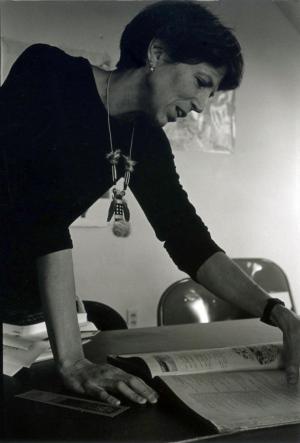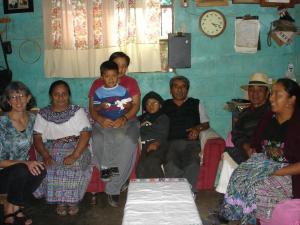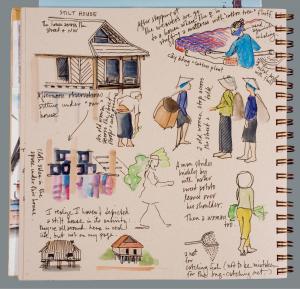Carol Hendrickson retires; Marlboro thinks the world of her

“People are born into worlds already rich with meaning, and grow up learning multiple senses of place,” anthropology professor Carol Hendrickson wrote in Potash Hill (Winter 2010). “When I first started doing anthropology fieldwork in Guatemala, I had a great deal of catch-up work to do to begin to navigate what others already knew about the places all around me.” Carol wasted no time gaining a sense of place at Marlboro when she first joined campus in 1989. She retires this year after 25 years of teaching “the three Rs:” reading, writing, and research in the form of fieldwork, considered the hallmark of anthropology.
Carol came to Marlboro after a year of teaching at Carleton College, with a doctorate from the University of Chicago. She had written her dissertation on women weavers in Guatemala, which resulted in her book Weaving Identities: Construction of Dress and Self in a Highland Guatemala Town (1995), selected by Choice as one of the best new books in anthropology. Like many faculty members, she was drawn to the small size at Marlboro and the ability to work closely with students.
“I guess I couldn’t really predict this from the start, but it quickly became clear that I loved doing tutorials,” said Carol. “Moreover, my family is from New England; my undergraduate experience was in New England (Bates); it was like coming home. It was just a really great place.”
According to Carol, the study of anthropology is important “because it teaches us that, culturally speaking, we’re not the only game in town.” In the classroom she liked to teach her students how to question assumptions about their own world and also come to understand the logic of worlds that initially might seem very strange. Carol believes that this permits her students to see other people’s lives, not to mention their own, with fresh eyes.
“Carol has always been welcoming of diverse ideas, and engaging with other faculty and disciplines in an appropriately critical way,” said Jeff Bristol ’09, who is now in a doctoral program in anthropology at Boston University. “This kind of interaction really is the hallmark and the benefit of being an anthropologist, and Carol was exemplary of that. I really couldn’t have had a better or more dedicated first mentor who was both theoretically strong and empirically conscious.”
“Carol brought to her teaching a cultural anthropologist’s keen way of observing the universe, finding unexpected connections, and unearthing the everyday lyrical-ness of life,” said Sari Brown ’11, who did her Plan of Concentration in religion and anthropology. “Without even meaning to, she was constantly collaborating with her students in their research, as she had an incredible knack for discovering, by chance, articles and ideas and occurrences that connected to their work.”

“I think there is flexibility here for me to really teach anything,” said Carol, who often collaborated with other faculty members in classes. “Anthropology is a subject that people don’t know a lot about, and so particular classes might bring in visual arts students, for example, and then they perhaps end up writing a Plan paper on the subject. Having control over your curriculum is really a plus.”
In addition to teaching popular classes like Ethnobiology, Senses of Place, Anthropology of Art, and Thinking Through the Body, Carol served as dean of faculty during the 1990s and director of world studies in the 2000s. She was a clear choice for the latter, with her international background and fieldwork experience.
“One of the things I really appreciated and made use of at Marlboro, in many ways, was the funding to go abroad,” Carol said. Her first Marlboro course trip was to the Yucatan in 2001, with biologist Bob Engel and ceramist Michael Boylen and five students, two of whom were in the World Studies Program (Potash Hill, Summer 2001). “That led to other trips such as the one in Vietnam, and co-leading trips to Cuba with Kate Ratcliff.” As director of world studies she also visited students doing WSP internships and study-abroad programs in Mexico and Spain. “Those were really excellent opportunities because I got the chance to see how those programs worked on the ground.”
Along the way, Carol developed a method of “visual field notes” that has augmented her learning process in the field and has been a key element of her recent academic work. Recent articles on the subject include “Visual field notes: Drawing insights in the Yucatan,” in Visual Anthropology Review (2008), and “Ethno-graphics: Keeping visual field notes in Vietnam,” in Expedition magazine (2010).

“Marlboro has been great in supporting research trips to Guatemala in the past 20 years,” said Carol. “I’m happy that I’ve kept a modest writing career in addition to the time teaching.” In 1999 Carol was awarded a coveted Fulbright-Hays faculty research grant for her work in Guatemala. In 2002 she came out with Tecpán Guatemala: A Modern Maya Town in Global and Local Context, co-written with Edward Fischer, currently being translated for publication in Spanish.
“Carol managed to stay well abreast of the anthropological world at large from Potash Hill, which itself can be challenging,” said Jeff. “More than this, however, she continued to do fieldwork, which is not only extremely commendable, but also rare among sociocultural anthropologists, many of whom are content to write a dissertation and then surround themselves with the world of theory.”
In fact, Carol is looking forward to doing more fieldwork in her retirement, visiting field sites at new times of year, reviewing her decades of notes and experimenting with new writing styles. She said that the challenge will be to keep up the energy and get projects done, but nobody else seems to doubt her ability to do that. As recently as November, she traveled to Chicago for the American Anthropological Association meeting to give two talks. One of them, called “Che’s Socks,” was about clothing and other relics of the Cuban Revolution, based on her many class trips to Cuba, and the other was about her visual field notes.
“One part of Marlboro that I have appreciated is my colleagues, and some students have become colleagues as well,” she said. “While they aren’t always in my disciplinary area, our conversations have been very important and pushed my work in new directions.” For example, for an article she’s writing on experiential learning in Vietnam, she asked Tessa Walker ’07 to send her some of her journal pages from their trip there together. “It’s great to keep up the conversations, and to hear what work they are doing, what graduate programs they are in.” Tessa is currently doing research on skateboarding as a mode of transportation for her master’s thesis project in urban studies at Portland State University, Oregon.
Sari said, “Carol worked endlessly to accompany her students in their passions, but she never seemed burdened by it; she seemed to really derive satisfaction from it.” Supported by an Aron Grant, Carol traveled to Bolivia with Sari, and collaborated with her on experimental, sensory-based ethnographic fieldwork. “Throughout the whole process, her humble but incredibly cultivated way of observing people and environments became a model not only of doing anthropology but of living in community that I will carry with me for the rest of my life.”
